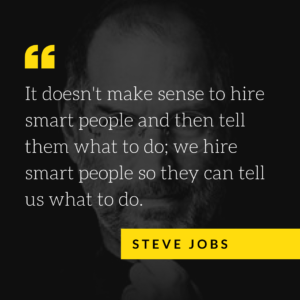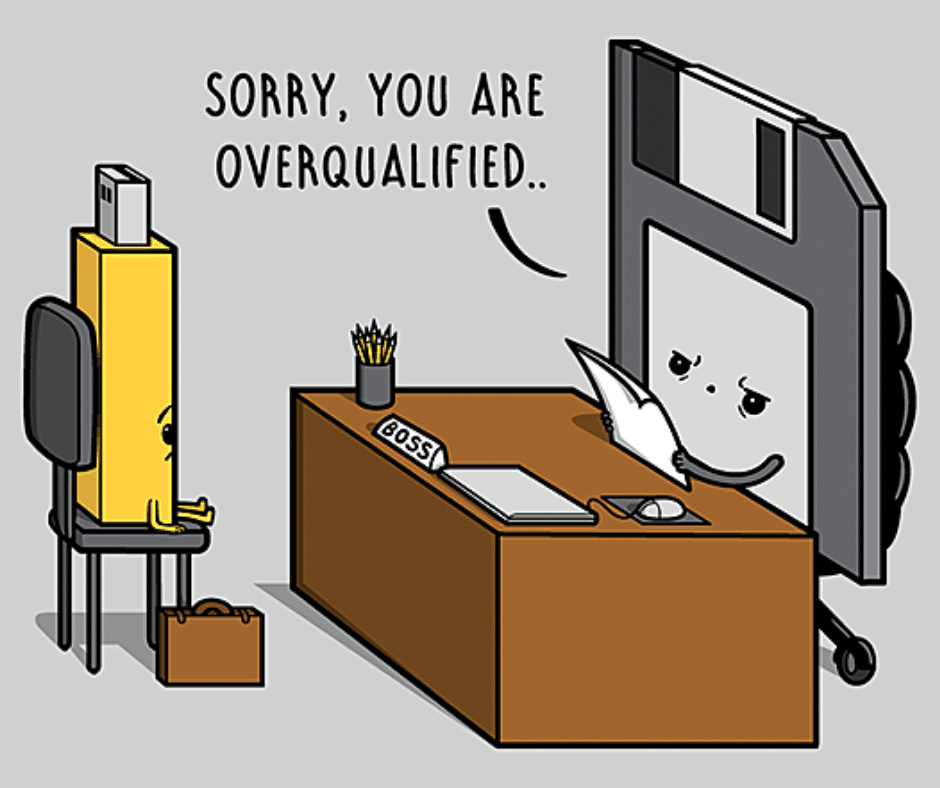Some people are hesitant to hire someone they consider overqualified.
But is this the right mindset?
A year or two with a superstar can impact equivalent of five years of a mediocre employee.
For years we’ve said you should hire overqualified for your temporary contracts.
Hitting the ground running requires experience and professionalism that only comes with years and exposure.
Read more in our white paper on working successfully with contract CPAs.
Starting 2022 on the Right Foot YE Help Tips.pdf

What about an overqualified hire for a permanent role?
Lots of people are hesitant to hire someone they consider overqualified.
But is this the right mindset?
Let’s walk through it!
The risk of hiring someone overqualified is that they want more right away.
In this case, they get disgruntled if they have to wait too long for a promotion or a transfer.
And before long they’ll be bored with the work of the role.
The desire for more brings on retention risk and the effort of rehiring.
There are ways to mitigate the risk though.
Many organizations (or roles) have a built-in timeline before they can consider someone for a transfer or promotion.
Hire someone overqualified and have diverse experience and a flair for continuous improvement.
You may find that the candidate can level up your process and automation in a way that offsets the short period.
Similarly, hiring someone who is a true leader and adds value to your culture, while being overqualified, can bring value in a shorter tenure.
A year or two with a superstar can impact equivalent of five years of a mediocre employee.
“Your employees should always be looking for a new job.Either they realize the grass isn’t greener,or they find an opportunity that you can’t give them.”
The tip above was the first management advice I ever got and I’ve held it true since. I learned it during an undergrad assignment and I’ve found it’s the best way to approach leadership. I raise it because it goes along with the Steve Jobs quote,
“It doesn’t make sense to hire smart people and then tell them what to do; we hire smart people so they can tell us what to do.”

The best managers hire smarter than them – and this can extend to overqualified too.
Working with your HR team, recruiter, or by doing a values assessment, should allow you to conclude the candidate isn’t applying for a job under them for the wrong reasons (like clock-watching or laziness).
If the candidate is overqualified and “smart,” it takes courage and a lack of ego to “take the risk.”
The best companies and teams build brave leadership.
But wait, are you still not seeing it?
Are you asking: Why would someone want a role if they were overqualified?
In today’s work-life world, there can be many drivers for people’s career decisions.
A diverse team should have room for this.
That’s how you surround yourself with new ideas and different points of view.
Here’s a few common reasons we see overqualified people get excited about new opportunities:
New industry – breaking into a new industry can be challenging, especially at your current level. For a senior manager or manager to leave an audit for industry, sometimes they need to take a step down. An energy person trying to move to financial services can require a lower level role to allow time for industry learning.
New city or country: Similar sacrifices can be required when families take the leap and move to new regions.
Life balance: Managing people isn’t something that a leader can do fast. People jobs are not efficient. The investment it takes to build rich relationships at a leadership level can mean sacrifices in personal time and priorities. Some people want jobs that can control the pace and scale while providing excellent results. They may be okay with necessary overtime on occasion, but they select efficient and skilled jobs to reduce the interferences and find balance.
Other priorities: If you are a parent or a caregiver of a dependent or elderly, you may not be in a position to take on a challenging role at work. Some people have side hustles these days, too, and the other parts of their career can reduce their energy available. Volunteer time, semi-retirement, and sports are excellent examples of other priorities that can influence the type of job you apply for and desire. Taking roles that people are overqualified for can be a necessary sacrifice. Prioritizing family or other matters is especially true for women and working mothers.

Leadership: There are mature and self-aware people that love being specialists or experts. They’ve hit a plateau in their career where the only direction to go is leadership or overqualified. For a person who has a passion for their trade or technical strength, not wanting a leadership role is a massive opportunity for any hiring manager. Leadership to many is primarily managing people, strategizing or playing corporate politics. Those who would instead put their head down and do the “real work” are not a sign of a risky hire or someone who isn’t ambitious. Ambition and goals come in different shapes!
None of these reasons imply that you are getting a less ambitious or hardworking person.
Instead, you can build a team of enriched life experience and get the point of view of an overqualified person with more responsibilities or interests beyond their job. They are often the best at adding value through amplifying too.
Purpose or why of the business: Some people join companies at any level they can. They want a chance to be part of the purpose and why of the business. If you have an organization like this, you’ll find more overqualified candidates than others! Be grateful!
In summary: ask yourself if there’s value in a new mindset.
Are there processes, technology or culture opportunities that a superstar could find engaging and make an impact?
Is there a chance to bring in someone that’s career path isn’t traditional and who could contribute significantly?
And are you a leader that can manage smart people?
If the role does not require continuous improvement and is already scaled and efficient then eventually boredom will overtake the candidate. There are few companies with positions like that.
If your organization and your team do not anchor on values and a clear why and purpose, it’s fair to expect that people will not last if they aren’t learning. That could reduce your ability to take on the overqualified.
Most of the time, a few years with someone strong can change the team and the role for the better.
If they move on quicker, the cost and time of recruiting might be worth it.
A significant impact from a star employee can cover the cost of rehiring.


Leave A Comment
You must be logged in to post a comment.